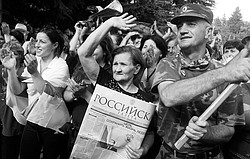West warns Russia over Georgia
Associated Press
INDEPENDENCE RALLY: People holding Russian newspapers attend a rally in Tskhinvali, capital of Georgia's breakaway province of South Ossetia. The rally Wednesday was to celebrate Russia's recognition of the independence of South Ossetia.
A top British official compared Russia’s move into Georgia to its 1968 invasion of Czechoslovakia.
TBILISI, Georgia (AP) — Western leaders warned Russia on Wednesday to “change course,” hoping to keep a conflict that already threatens a key nuclear pact and could even raise U.S. chicken prices from blossoming into a new Cold War.
Moscow said it was NATO expansion and Western support for Georgia that was causing the new East-West divisions, and Prime Minister Vladimir Putin lashed out at the United States for using military ships to deliver humanitarian aid to Georgia.
Meanwhile, Georgia slashed its embassy staff in Moscow to protest Russia’s recognition of the two separatist enclaves that were the flashpoint for the five-day war between the two nations earlier this month.
The tensions have spread to the Black Sea, which Russia shares unhappily with three nations that belong to NATO and two others that desperately want to, Ukraine and Georgia. Some Ukrainians fear Moscow might set its sights on their nation next.
In moves evocative of Cold War cat-and-mouse games, a U.S. military ship carrying humanitarian aid docked at a southern Georgian port, and Russia sent a missile cruiser and two other ships to a port farther north in a show of force.
The maneuvering came a day after Russian President Dmitry Medvedev had said his nation was “not afraid of anything, including the prospect of a Cold War.” For the two superpowers of the first Cold War, the United States and Russia, repercussions from this new conflict could be widespread.
Russia’s agriculture minister said Moscow could cut poultry and pork import quotas by hundreds of thousands of tons, hitting American producers hard and thereby raising prices for American shoppers.
Russians sometimes refer to American poultry imports as “Bush’s legs,” a reference to the frozen chicken shipped to Russia amid economic troubles after the 1991 Soviet collapse, during George H.W. Bush’s presidency.
And a key civil nuclear agreement between Moscow and Washington appears likely to be shelved until next year at the earliest.
On the diplomatic front, the West’s denunciations of Russia grew louder.
Britain’s top diplomat equated Moscow’s offensive in Georgia with the Soviet tanks that invaded Czechoslovakia to crush the Prague Spring democratic reforms in 1968, and demanded Russia “change course.”
“The sight of Russian tanks in a neighboring country on the 40th anniversary of the crushing of the Prague Spring has shown that the temptations of power politics remain,” Foreign Secretary David Miliband said.
Western leaders have accused Russia of using inappropriate force when it sent tanks and troops into Georgia earlier this month. The Russian move followed a Georgian crackdown on the pro-Russian South Ossetia.
Many of the Russian forces that drove deep into Georgia after fighting broke out Aug. 7 have pulled back, but hundreds are estimated to still be manning checkpoints that Russia calls “security zones” inside Georgia proper.
German Chancellor Angela Merkel pressed Russian President Dmitry Medvedev in a phone call to immediately fulfill the EU-brokered cease-fire by pulling all troops out of Georgia.
The Kremlin rejected Western criticism, and Tuesday even suggested the conflict could spread. It starkly warned another former Soviet republic, tiny Moldova, that aggression against a breakaway region there could provoke a military response.
French President Nicolas Sarkozy accused Russia of trying to redraw the borders of Georgia. His foreign minister went further, suggesting Russia had engaged in “ethnic cleansing” in South Ossetia, one of the two Georgian rebel territories.
 43
43

